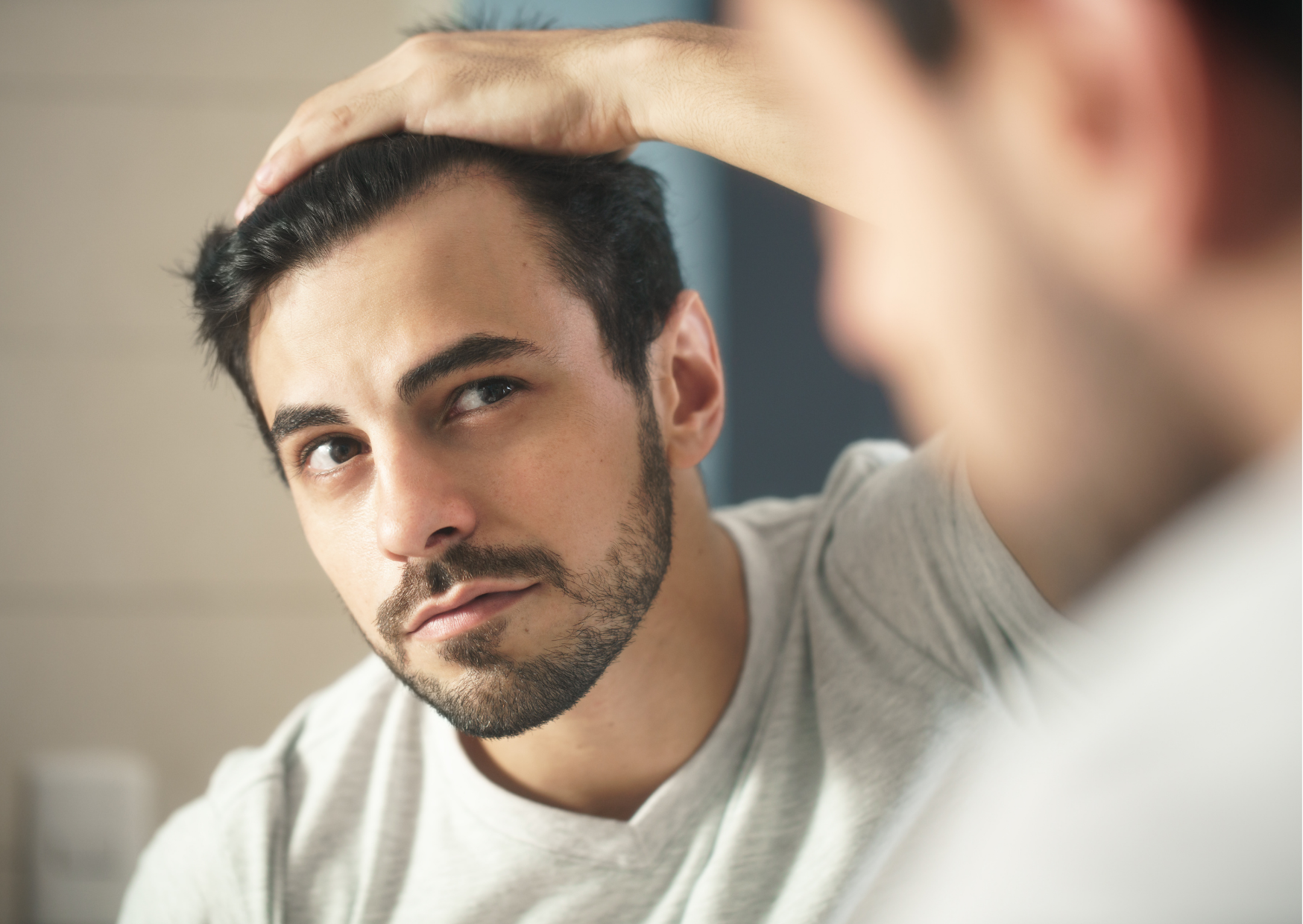Keto definitely causes hair loss or at least shedding. Some people, like me, find that there is no real change to their hair until they’re washing it and see massive amounts of hair in the shower drain. Others notice thinner, less full looking hair within the first week of switching over to keto.
Most likely this is because the hair that is shed isn’t being replaced as quickly. The body senses that something is wrong and slows down the production of the new hair to preserve the old.
This makes me wonder, does keto really cause hair loss? Or would it be better said that keto causes hair loss because your body slows its production of new hair while you get used to keto? I think that it really comes down to your body adjusting and becoming better at using fat for energy.
Table of Contents
Here’s what we know:

Not all people lose hair when switching over to keto, in fact most don’t. There are plenty of people who have been in ketosis for years with very little change to their hair. It almost seems that the longer you’ve been keto, the less hair loss you have. Some people start keto and after a few weeks hair starts dropping out in showers, other people notice nothing for months.
I don’t think there are any studies about keto causing or preventing hair loss so it’s hard to say what is going on. I’ve been keto for almost a year and my hair loss still seems to be happening, but at a much slower rate than when I first started.
Anecdotally, it seems that the longer you’re in ketosis, the less hair loss you’ll experience. This makes me wonder if keto reverses hair loss. However, in all of the accounts that I’ve read about it seems like most people don’t notice any reversal, but only a slow halt in shedding if they are keto long enough.
Hair is dead at the base so even though there are changes with the growth cycle of our hair, it’s not causing your body to shed dead hair. So put down the Rogaine, there are probably better keto supplements out there that you should be taking anyway…
Side note: There is another condition called telogen effluvium which can cause massive amounts of hair to shed. It is related to stress and hormonal changes in the body and doesn’t happen all at once. It’s not uncommon to lose clumps of hair after a major stressor like death, moving, illness etc. However, this kind of hair loss usually starts 2-3 months after the stress and can last for as long as 6 months.
So even if it seems like keto is causing your hair loss, research telogen effluvium and see if that’s a better fit for you.
what causes hair loss on keto diet?
It is speculated that the ketogenic diet can lead to hair loss. Hair loss occurs when there is a large amount of testosterone in the body and if the individual has male pattern baldness, their hairline will begin to recede. There isn’t any research on this but given how low the carbohydrate intake is, it’s possible it can lead to hair loss.
How to fix the problem of hair loss on keto?
There isn’t any research available but there are a few things that can be tried:
Try eating more fruits and vegetables on your diet. Some of these contain micronutrients and antioxidants which may help your hair stay strong, healthy and not fall out as much.
if you are taking supplements, take them with food instead of on an empty stomach to reduce the chance of nutrient deficiencies. Vitamin B deficiency has been linked to hair loss in some cases stop the ketogenic diet and eat a balanced diet like normal people do! (this is our personal opinion, by the way)
The media has hyped up the keto diet but in reality it’s not that good for you. It also isn’t sustainable for many people who don’t want to give up carbs permanently. It is recommended that instead of following a fad diet, people should eat a balanced diet where they can get all their required nutrients in order to have a healthy, happy life.
What is the keto diet?
The ketogenic diet is a very low carbohydrate, high fat diet. Some people aim for 70-75% calories from fat and 20-25% calories from protein while others eat more protein and less fat to compensate.
Where can we find more information about hair loss and the keto diet?
There isn’t any reliable information or research that we could find on the internet. If you want to try it for yourself, make sure to consult with a doctor before doing so and do some more research on your own! And if you’re looking for a good book about ketogenic diets, there is one here.As always, please let us know if you have any questions or comments! Thanks for reading.
what is healthy hair and what is not
Healthy hair is supple, smooth and shiny. It doesn’t break as easily as damaged hair, it stays clean for longer and it is less greasy that unhealthy hair. Hair colour may be faded or lacklustre with unhealthy hair but it can also be patchy or just simply sparse and thin with unhealthy hair.
What are the causes of unhealthy hair?
There are many reasons for unhealthy hair. It could be caused by poor nutrition, lack of exercise or vitamins, stress, damaged hair, medications and even smoking! These are just some of the most common factors which lead to unhealthy hair. If you suspect that any of these may be causing your hair to be unhealthy, stop doing them immediately!
How can we make our hair healthier?
Good nutrition and a healthy lifestyle are the best ways to have good healthy hair. Keep your stress levels down and eat a balanced diet with all the required nutrients in order for your body to function properly. Exercise regularly and drink lots of water. Get enough sleep and regularly wash your hair. If you have any further questions, please let us know by commenting down below!
How to stimulate hair follicles for hair growth?
The first thing you need to do is switch your diet and lifestyle to one that stimulates keratinocyte stem cells (hair follicle stem cells) and supports their function:
Eat more vegetable protein, instead of animal protein
Increase your omega 6 intake by eating more nuts, seeds and avocadoes. Reduce your insulin levels by lowering the amount of carbs in your diet to 40% or less. You can also lower it further by avoiding grains all together since they are pro-inflammatory. If you exercise regularly you can even remove all carbs from your diet.
Remove inflammatory sugar substitutes like high fructose corn syrup and replace it with natural sweetness, such as Stevia.
Get rid of most processed food in your house because they are usually loaded with sugar, fat and preservatives that affect hair growth negatively. Replace them with healthy fats, nuts, seeds and vegetables.
Exercise to boost your leptin levels, which is a hormone that regulates many functions in the body including hair growth. It has been shown that people with high leptin levels have faster growing and thick hair. Exercise will also help you sleep better at night, which is another element needed for proper hair growth.
Improve your gut health by taking probiotics and consuming bone broth.
Get at least 7-9 hours of sleep per night.
The solution is to switch your diet, but if you are already following a ketogenic diet I would also consider supplementing with exogenous ketones (ketone esters) to elevate your ketone levels. Ketones will help your body produce more HGH, also known as “the fitness hormone”.
HGH is a very potent stimulator of hair follicles in the anagen phase. This will help you thicken your existing hair and grow new ones.
How to prevent keto-hairloss?
There are many factors that can accelerate or slow down hair loss:
Gut health- I already mentioned that improving your gut health will help you grow thicker and faster. Not only will it improve digestion, but also strengthen the immune system that is responsible for preventing infections such as bacterial and fungal infections. These can cause severe damage to the follicle and lead to permanent hair loss .
Inflammation – inflammatory conditions such as adult acne and other skin conditions will cause hair loss. This can be prevented by supplementing with anti-inflammatory fish oil or Krill Oil if you do not get enough from the food you eat.
Diets high in trans-fats and processed vegetable oils – these are very inflammatory for the body and will lead to many inflammatory conditions.
Pesticides, herbicides and other toxic elements – these are being exposed to our environment on daily basis through the food we eat, water we drink and the air we breathe. These can lead to hormonal imbalance or suppression which affects hair growth.
Ketone esters have been shown in studies to boost HGH production by up to 400% during exercise sessions. HGH is an important hormone for hair growth, so this is what you need to achieve if you want thicker hair on a ketogenic diet.
A ketogenic diet based on vegetable oils and low in omega 6 is not ideal for preventing hair loss or stimulating keratinocyte stem cells that are responsible for producing hair.
Keto hair loss? What does science say?
No research has been done on directly testing ketosis and ketogenic diets on women with PCOS, however a lot of research has been conducted on fasting, a related dietary intervention. We know that calorie restriction will lower insulin levels which is good for the entire body including the ovary and uterus. It will also help rebalance estrogen and progesterone levels, which is helpful for PCOS and anovulation. Women undergoing fasting therapy showed significant improvement in weight loss and ovulation, as well as resumption of their periods and decrease in testosterone levels.
Rapid weight loss on keto
The ketogenic diet is the fastest way to lose weight, but it can also lead to hair loss. When you are on keto, your insulin levels tend to drop which in turn causes the body to release more male hormones (androgens). Testosterone converts into Dihydrotestosterone (DHT) in the body and this hormone is the driving force behind hair loss for those with a genetic predisposition.
In order to prevent this from happening, you need to make sure your body is producing ketones as a result of being on a well-formulated ketogenic diet. You can do this by taking exogenous ketones or MCT oil . Not only will these elevate your ketone levels to a therapeutic level for reversing insulin resistance and obesity, but they will also prevent the male hormones from converting into DHT.
How long does keto hair loss last?
If you are losing hair on keto it is safe to say your diet is not well formulated. You should consider consulting a professional who can tailor a diet for you that will help you lose weight without the use of exogenous ketones or MCT oil.
It typically takes 4-6 months before most people start seeing results on keto. You will not experience hair loss if you are making ketones, but without them, your insulin levels will be lower resulting in male hormones being released more freely. I have seen women on my blog who experienced faster results when they started taking exogenous ketones or MCT oil.
As with any diet, you should stick to it until you find what works best for you. You will know if it is working or not by looking at the number on the scale and your blood markers, but also how your hair looks and feels.
The ketogenic diet is an effective tool to lose weight, reverse insulin resistance and reduce inflammation in the body. It can be very helpful for women with PC OS and anovulation to help improve their chances of getting pregnant.
What are the negative side effects of ketosis?
The main side effect of ketosis is the “keto flu” which is a result of being on a low-carb diet. It typically lasts 3-4 days and it includes symptoms such as headache, lethargy, constipation and loss of appetite. As you can imagine these can impact your weight loss efforts which is why I recommend slowing transitioning into a ketogenic diet by gradually decreasing your carbs over a few weeks.
Cortisol is another stress hormone that can be increased on a ketogenic diet. Cortisol is the stress hormone responsible for creating fat from carbohydrates, so keeping it low will help you lose weight without losing muscle or water retention. Excess cortisol can also lead to increased inflammation in the body which is why it is important to cycle your ketogenic diet and incorporate some carbs from time to time.
In order to manage cortisol levels, I recommend supplementing with a magnesium supplement before going to sleep, as well as a B complex. You should also include plenty of healthy fats in your diet such as avocado oil, coconut oil, grass-fed butter and MCT oil.
In addition to all of these supplements, you should also make sure that you are getting more minerals from your diet. This means eating a lot of dark leafy greens such as kale and spinach. I recommend a minimum of 4 servings a day in order to get enough magnesium and potassium.
If you feel like your hair is thinning, there is a good chance that your diet and stress levels need to be addressed.
The ketogenic diet can be helpful for women who are dealing with PCOS and insulin resistance as long as they eat the right foods and supplement appropriately. As with any diet, it will take some time before you start seeing results, but it is definitely worth the wait.
While there are a number of supplements that you can take in order to help reduce cortisol levels and improve your hair health on keto, the most important thing is to eat a well-formulated ketogenic diet full of healthy fats and enough vegetables.







